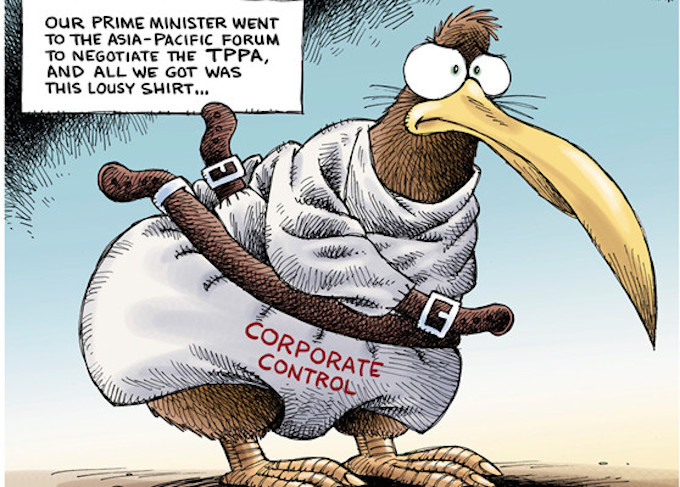Media release from the Public Health Association
The Public Health Association of New Zealand (PHA) is questioning the rush to sign the Trans Pacific Partnership (TPP) Agreement and says there remain too many unanswered questions; too much public unease; and a palpable lack of detailed analysis for us to be adding our signature so quickly.
“We may be flattered to have been selected as the country where the TPP will be signed in February, but that shouldn’t distract us from the very real questions and concerns around this agreement,” says PHA chief executive Warren Lindberg.
“Disquiet has been prominent in the news of late, coming from a number of fronts including copyright and education. This indicates that full analysis of just what this agreement will cost the various sectors has not been done.
“There has also been very little legal or academic analysis or commentary. The document amounts to 6000 or more complex pages and has been public knowledge for far too short a time for proper analysis, so why we’re so hell bent on signing is perplexing.”
Media reports indicate the US Congress is not likely to sign the TPP it until after federal elections in November and indications are that US lawmakers will want substantive changes.
“Even if you don’t accept that the TPP is already a potential time bomb for New Zealand, it just doesn’t make sense to sign an international agreement that could well change to our detriment,” Lindberg says
Health implications
Instead, the PHA is suggesting New Zealand takes the valuable few months it still has and that the agreement be sent to Select Committee so thorough public and political analysis can take place before anything is signed.
“There has been no official opportunity for people to comment, or for issues specific to New Zealand to have been analysed in detail,” Lindberg says.
“Considering the widespread and substantial misgivings around the TPP and the time we have up our sleeve, there is nothing to stop us doing this.”
Lindberg says arguments that most of the population is happy with the agreement, or that those opposed are just anti-trade, are either seriously misinformed or disingenuous. He says the PHA and others are in favour of international trade where it doesn’t impinge on the real or potential wellbeing of New Zealand’s people.
“We’re most concerned with the health implications, such as the cost and accessibility of pharmaceuticals – and other issues that would impact our health system and how we combat inequalities here at home. These are real issues we’re struggling with even before this deal becomes a done thing.”
Lindberg says the ISDS clauses which can be used by multinationals to sue governments also remain a serious concern, with the latest example being energy firm TransCanada Corp suing the Obama Government for its withdrawal from an oil agreement.
“We may think that barring big tobacco from using the ISDS clauses has put the issue to bed. It hasn’t, and there remain plenty of other multinationals prepared to further their own interests at the expense of smaller economies like ours – such as big pharma, big food and big energy.
“If we act in haste now, the repenting we do at leisure may well be very unpleasant. The Government has both the time and the means to ensure the TPP is more thoroughly examined and should not waste what opportunity there is left.”









































